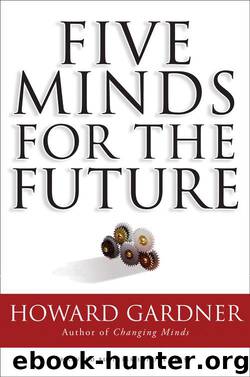Five Minds for the Future by Gardner Howard

Author:Gardner, Howard [Gardner, Howard]
Language: eng
Format: epub
Publisher: Perseus Books Group
Published: 2009-02-01T05:00:00+00:00
CREATIVITY BY GROUPS, LARGE AND SMALL
Except in the area of business, most studies of creativity, and most students of creativity, have focused on the minds, the methods, and the motivations of the individual creator. This bias reflects the interest of psychologists, on the one hand, and the romance associated with individual inventive personalities, on the other. Creativity by dyads, trios, or larger groups is seen as anomalous, or simply as the sum of the capacities of the individual members of these groups.
The limits of this focus on the individual are becoming clear. In the sciences—be it particle physics or genomics—a great deal of the most important work is carried on by huge teams, often numbering many hundreds. Artistic productions on the stage or on the screen also involve large ensembles of personalities, often creative, often prickly, often clashing. In the period of mass media, the potential of a work to appeal to millions of persons is at a premium; and sometimes the plug is pulled on a huge work involving representatives of several arts and crafts, if early signs suggest that it will fail to appeal to a sufficiently wide audience. In the area of management consultancy, teams swoop down on a company in crisis, trouble-shoot, and then issue their report and their recommendations. I call these kinds of collaborations “Hollywood-style”; large numbers of persons, often unknown to one another, must come together over brief periods of time, make the necessary connections, and trust one another to complete the job efficiently and move on to the next assignment—be it making a movie sequel or advising another corporation.
Yet another form of group creativity has recently coalesced— the wisdom of crowds. We see this phenomenon at work in the Google sources that are most popular, the Amazon books that are recommended, the eBay sellers who are most trusted. Open source programming, where dozens of individuals may make contributions to a computer program, is another, often touted instance. Perhaps the clearest—and one of the most controversial—examples is Wikipedia. This twist on the traditional encyclopedia features entries that are originally posted by one or more authors, and then subjected to as many rewrites—and, one hopes, as many improvements—as there are individuals prepared to spend time researching the topic and contributing new verbiage.
The question arises about whether ideas about creativity need to be refashioned to take into account the increasing number of projects and realms where the individual contribution seems less critical, the group mind more crucial. Clearly, the abilities to come to know individuals quickly, to forge a working relationship, to handle issues of conflict and credit, take on added importance. Brainstorming and improvisation come to the fore; personal glory recedes in importance.
My own take on this issue involves a recognition of a continuum. At one end of the continuum, one finds a deep societal issue like the causes of poverty or the pervasiveness of racism, one not open to ready formulation or solution. Solutions offered by the public at large are unlikely to be helpful.
Download
This site does not store any files on its server. We only index and link to content provided by other sites. Please contact the content providers to delete copyright contents if any and email us, we'll remove relevant links or contents immediately.
Hit Refresh by Satya Nadella(9111)
The Compound Effect by Darren Hardy(8913)
Change Your Questions, Change Your Life by Marilee Adams(7725)
Nudge - Improving Decisions about Health, Wealth, and Happiness by Thaler Sunstein(7684)
The Black Swan by Nassim Nicholas Taleb(7095)
Deep Work by Cal Newport(7051)
Rich Dad Poor Dad by Robert T. Kiyosaki(6585)
Daring Greatly by Brene Brown(6494)
Principles: Life and Work by Ray Dalio(6393)
Playing to Win_ How Strategy Really Works by A.G. Lafley & Roger L. Martin(6196)
Man-made Catastrophes and Risk Information Concealment by Dmitry Chernov & Didier Sornette(5992)
Digital Minimalism by Cal Newport;(5743)
Big Magic: Creative Living Beyond Fear by Elizabeth Gilbert(5731)
The Myth of the Strong Leader by Archie Brown(5484)
The Slight Edge by Jeff Olson(5402)
Discipline Equals Freedom by Jocko Willink(5365)
The Motivation Myth by Jeff Haden(5196)
The Laws of Human Nature by Robert Greene(5145)
Stone's Rules by Roger Stone(5070)
